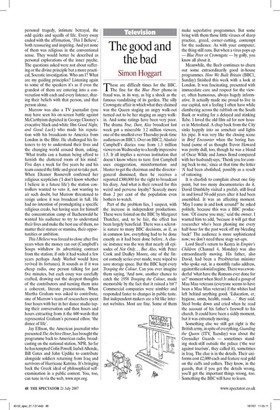The good and the bad
Simon Hoggart rr hese are difficult times for the BBC.
The fine for the Blue Peter phone-in fraud was, in its way, as big a shock as the famous vandalising of its garden. The silly Crowngate affair in which what they claimed was the Queen staging an angry walk-out turned out to be her staging an angry walkin. And some ratings have been very poor. The drama True, Dare, Kiss broadcast last week got a miserable 3 2 million viewers, one of the smallest ever Thursday peak-time audiences on BBC1. Over on BBC2, Alastair Campbell's diaries rose from 1.3 million viewers on Wednesday to a hardly impressive 1.5. It all implies a nervous institution that doesn't know where to turn: first Campbell uses exaggeration, misinformation and bluster to get the chairman and the directorgeneral dismissed, then he receives a reported £300,000 for the right to broadcast his diary. And what is their reward for this weird and perverse loyalty? Scarcely more than 2 per cent of the population even bothers to watch.
Part of the problem lies, I suspect, with the increase in independent productions. These were foisted on the BBC by Margaret Thatcher, and, to be fair, the effect has been largely beneficial. There was a sclerotic nature to many BBC decisions, as if, as in common law, everything had to be done exactly as it had been done before. A classic instance was the way that nearly all episodes of Not Only. . . But Also, with Peter Cook and Dudley Moore, one of the finest comedy series ever made, were wiped to save storage space. But the BBC kept every Trooping the Colour. Can you ever imagine them saying, 'And now, another chance to catch the 1958 Trooping the Colour, made memorable by the fact that it rained a bit'? Commercial companies were nimbler and responded faster to changes in public taste. But independent makers are a bit like internet websites. Most are fine. Some of them make superlative programmes. But some bring with them those little viruses of sharp practice, greed, corner-cutting, contempt for the audience. As with your computer, the thing still runs. But when a virus pops up — Blue Peter or Crowngate — by golly, you know all about it.
Meanwhile, the Beeb continues to churn out some extraordinarily good in-house programmes. How We Built Britain (BBC1, Sunday) finished this week with a look at London. It was fascinating, presented with immaculate care and respect for the viewer, often humorous, always hugely informative. It actually made me proud to live in our capital, not a feeling I often have while clambering across the rubbish on the South Bank or waiting for a delayed and stinking Tube. I loved the old film ad for new houses in Metroland. A chap back from the City sinks happily into an armchair and lights his pipe. It was very like the closing scene in Brief Encounter when the boring husband (some of us thought Trevor Howard was pretty dull, too, though he was a blend of Oscar Wilde and James Bond compared with her husband) says, `Thenk you for coming beck to me,' since at that time the letter 'A had been abolished, possibly as a result of rationing.
It is churlish to complain about one tiny point, but too many documentaries do it. David Dimbleby visited a prefab, still lived in and loved 50-odd years after it had been assembled. It was an affecting moment. 'May I come in and look around?' he asked politely, because this was a BBC production. 'Of course you may,' said the owner. I wanted him to add, 'because it will get that researcher who's been phoning me every half-hour for the past week off my bleeding back!' The audience is more sophisticated now; we don't need these stagy set-ups.
Lord Steel's return to Kenya in Empire's Children (Channel 4, Monday) was also extraordinarily moving. His father, also David, had been a Presbyterian minister who spoke out, in a monthly radio address, against the colonial regime. There was a wonderful 'what have the Romans ever done for us?' moment when Steel Jr asked a group of Mau Mau veterans (everyone seems to have been a Mau Mau veteran) if the whites had left behind anything good. 'Education, er, hygiene, umm, health, roads ... ' they said. Steel broke down and cried when he read the account of his father's farewell to his church. It could have been a sickly moment, but it was extremely moving.
Something else we still get right is the British army, in spite of everything. Guarding the Queen (ITV, Tuesday) was about the Grenadier Guards — sometimes standing stock-still outside the palace (the war against tourism', they called it), sometimes in Iraq. The clue is in the details. Their uniforms cost £2,000 each and feature real gold on the cuffs and collars. They know, in the guards, that if you get the details wrong, you'll get the important things wrong, too. Something the BBC will have to learn.












































 Previous page
Previous page